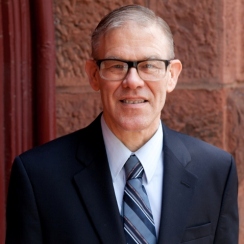Personal identity has become an explosive issue in our time, and was the focus of the recent conference of the L’Abri Fellowship in Rochester Minnesota. Dick Keyes, Director Emeritus of the L’Abri Fellowship in Southborough, Massachusetts, discussed the “shrinking foundation” of identity in the western world, and true human identity in God’s image, in two lectures.
With the imposition of same-sex marriage and the advent of self-defined sex, much has changed over the past decade. People press their identity claims against traditional understandings. Nevertheless, people have not changed, Keyes observed. They may raise different issues, but they continue to be human. Further, “God has not changed,” Keyes said that personal identity is indeed “a question that the Bible does address.” Identity can mean one of two things. First, human beings have a unique capacity to “reach out and turn back on ourself.” This is our ability to be self-conscious, and have a picture of who we really are. But secondly, there is also “the image of yourself that you try to project to other people.” Sociologist Irving Goffman spoke of this as “impression management,” and said that it is the main thing that human beings do in all their social interactions. This raises the question of how much the private view of the self corresponds to the projected image of the self. Identity can thus be a problem, because it’s both an image of one’s self, “and self-acceptance of that self.” What people need is both coherence in their personal identity over time, and self-acceptance of their identity.
Identity gives “unity in the midst of a lot of divergent, conflicting, clashing images of ourselves, pictures of ourselves, impressions of ourselves, verdicts about ourselves.” Identity is not something we can find in physical reality. You don’t find it “in the way you would lost care keys … We’re most conscious of the issue of identity when we’re aware of being without it.”
During the twentieth century, psychologist Erik Erikson coined the term “identity crisis,” and popularized the concept. Identity was less of a problem before Darwin. By dispensing with the notions of divine order and natural order in favor of an ever evolving reality, the crisis of identity has become intense. “The human need for identity called for the Biblical God he [Erikson] did not believe in.”
A strong sense of identity frees an individual to get on with life. It also pushes us beyond our own identity to the foundation of personal identity. No foundation is possible if we “are just strange, out of place accidents.” Living on a tiny blue speck in the Milky Way galaxy, many of today’s thinkers believe that there is no foundation for personal identity, although they do not personally “live by that judgment.” Keyes said that “God alone” is the foundation for our personal identity, not “biochemistry,” “the late hunter-gatherer society,” “parents,” “majority vote” or “the shopping mall.” God claims absolute self-sufficiency in his name “I Am That I Am.” He is not identified by contingent things like thought, feeling, vocation, etc. We are contingent beings, but are securely identified by our relationship with God.
The Bible, Keyes believes, provides four building blocks of identity: 1) moral convictions, 2) heroism, 3) dominion (or agency), and 4) love. Failure in these areas “make us uncertain about who we are, they leave us with hatred and disgust over ourselves because of what is revealed to us by our own failures.” Citing Francis Schaeffer, he said that a person needs “moment by moment forgiveness” from God.
Our morality is determined by how well we image God. The more we become like God, the more we image his character known from his commandments, the more we become ourselves. Sin on the other hand “scars our identity.” He referred to a saying common at the L’Abri Fellowship, that every human being “is a glorious ruin.”
With respect to heroism, Keyes said that “heroes show us honor, glory, and true greatness.” They “connect your imagination to your own future.” Heroes “give specific shape” to some personal aspiration. They help in giving shape “to who you actually want to become.” True heroes excel in godly callings. Popular culture has caused a problem in this area, with what Keyes called “pseudo-heroes … pseudo-heroes get stuck” in our minds, and become tyrants “and work us over with shame that we shouldn’t have to experience at all.” In its “strongest form,” shame makes us feel “that we shouldn’t exist at all.”
He said that the concepts of “dominion” and “love” are also important in shaping identity. The divine command for dominion is found in Genesis (Gen. 1:26-28). Children exercise dominion in the joy of learning; “walking, talking, riding a bicycle.” These are examples of dominion, because they are an ordering of reality according to the human nature God has given us. There is a close connection between “dominion and being made in the image and likeness of God … We are called to form ourselves or shape ourselves, or mold ourselves” around God’s image. We form ourselves around God’s image when we form ourselves according to his character” (love, holiness, justice, mercy). But dominion becomes domination when we “step outside what God has told us to do.”
Due to the fall, “our dominion is diminished,” but we still have dominion. However, “we can neglect, or abdicate, our dominion.” This is a “retreat from the world;” we “let the world go by.” People who thus retreat from the world are “spectators to their own lives.” Keyes said that Scripture is full of “passive language about failed dominion as a result of sin. We are slaves to sin.” We are “captives to lusts.” A life in sin is “characterized by a loss of control.” He cited Prov. 25:28 (“a man without self-control is like a city without walls.”)
With respect to love, Keyes said that “we are made in the image and likeness of God … and God is love.” Love should pervade our identity. “When we love others, it builds up our sense of identity.” He referred to chapter 13 of First Corinthians, that says that all other gifts – whether faith, knowledge, prophecy, or miracles – are worthless without love. This truth about the centrality of love “is pretty heavy duty,” he said
Why is the foundation of modern identity shrinking? Keyes said it is because people are looking elsewhere than to God for the source of their identity. People look “within you or around you for some base for your identity.” Quoting G.K. Chesterton, Keyes said that “when a man ceases to worship God, he does not worship nothing, he worships anything.” This “carries the exhilaration of freedom in untethering yourself from the authority of God … [but] retethering yourself to something less than God, which God has made.” He mentioned Jesus’ warning “about having your treasure in the wrong place, where it could be destroyed or stolen.” He said that this means that “your heart will move to reside to wherever your treasure is.” Instead, we should have it “with, and in God.”
Idolatry tries to get identity from something which is not only less than God is, but less than we are. Keyes cited “money or economic status” as a very common American idol. Another, he said, “would be race or ethnicity.” “Sex and gender” are very easy places to find one’s identity. “Nationality,” “family,” or “political loyalties” were other possible sources of identity. Another possibility, perhaps less often thought of, is one’s own talents, or personal recognition or reputation. Keyes emphasized that these factors about a person can be part of their identity, but should not the overriding factor in it. The “central anchor” of our identity should be Christ. Other factors, money in particular, may be lost, and we still exist.
On the positive side, Keyes said that “the object of our aspiration is Jesus.” He is the apogee of human excellence. Keyes believes that we can identify from the New Testament six ways in which we can imitate Christ. These are humility, love, service, forgiveness, willingness to suffer unjustly, and courage. The point, Keyes said, is not to “do this list,” but to “see them in the life of Jesus.” It is a matter of “educating our desires.” Despite the emphasis on humility and willingness to suffer, heroism and glory “ought to be our aspiration.” But it is found in imitating Christ. He said that the early Christians had “a community of imitation.” They imitated fellow Christians and other churches.
Christian identity is in contrast to the common contemporary association of identity with victim categories, which give identity “great authority” in the contemporary world. But if we decide to stand with people “who are victims as you are a victim, your group is liable to split, because your victimhood isn’t quite like [that] of somebody else.”
Keyes said that while we should be grateful to Christ for saving us, in discipleship we imitate Christ, and are in that respect heroic. He said that “the Christian life can be murder if you get things wrong.” Even in very difficult situations, we must look to Christ, and be aware of our identity in him.
Keyes concluded with Gal. 3:27-29, (in Christ there is neither Jew nor Gentile, slave nor free, male nor female). Christians are “all one in Christ Jesus.” Each distinction Paul referred to was contentious in the first century, and continues to be today. These were conflicts between “partial identities.” Conflict always tends to “ramp up and inflate” differences, and the identities the differences are based on. These identities are overshadowed by the identity of God in Christ. The partial identities don’t “go all the way down in terms of who we are.” But “the image of God does go all the way down to the bottom of who we are.” Keyes observed that the Romans called Christians “the third race, because they could hold together contentious groups that nobody else could hold together.” He said that Paul’s message was that Christians can “rise to the challenge because of who you are.”
Several subsequent lectures drew out the problems faced in the identity crisis of today’s post-Christian society, and will be reviewed in future articles.
No comments yet





